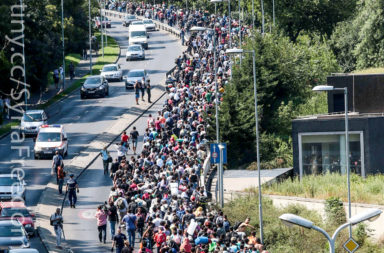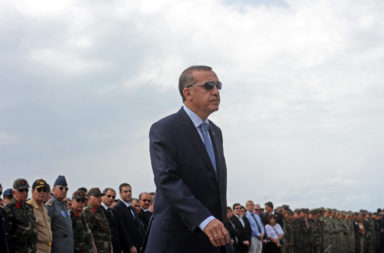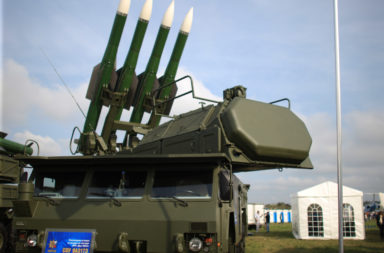Relations between Turkey and Russia are finally warming. On August 9th, Turkish President Recep Tayyip Erdogan met with Russian President Vladimir Putin at the Konstantin Palace just outside of St. Petersburg.
- Cooperation in trade and military were discussed, and both parties have pledged to normalize economic relations.
- Putin said that “The priority is to get back to the pre-crisis level of cooperation.”
- This warming of relations comes after nine months of trade sanctions and quarreling which followed the Turkish air force downing of a Russian jet in November 2015.
Erdogan said “the Moscow-Ankara friendship axis will be restored.”
But what will this friendship axis entail?
- Apparently, they plan to resume trade between the two countries up to $100 billion.
- And they will cooperate not just economically, but militarily as well.
- Two days after the meeting between Putin and Erdogan, the Turkish Foreign Minister threatened to leave NATO due to lack of support after the attempted coup.
- Turkey plans to start working with Russia on solving the crisis in Syria.
After the Turkish air force shot down a Russian Suchoi Su-24 strike aircraft on the border of Syria last November, Russia placed trade sanctions on Turkey and suspended Russian package tours there.
But, suddenly, relations are on the mend. What led to this?
- According to the Kremlin, in June of 2016, months after the downing of the jet, Erdogan apologized and expressed his sympathy for the family of the pilot who was killed.
- Shortly after this, in July after the attempted coup in Turkey on the 15th, Putin made his support of Erdogan known. He also didn’t criticise him for purging alleged plotters in the military and political spheres.
- At their meeting in St. Petersburg on the 9th of August, Erdogan said that the supportive call from Putin after the coup attempt “meant a lot psychologically.”
- Erdogan’s body language at the meeting conveyed his sincerity, which you can see in the picture below. Erdogan also made an effort to ingratiate himself to Putin, by referring to him as “my dear and respected friend.” Putin referred to him as “Mr. Erdogan,” maintaining a certain level of formality, the contrast of which indicated they weren’t on equal terms in his eyes.
The body language: Putin and Erdogan pic.twitter.com/Pgee4EzCLq
— kurdish blogger (@kurdishblogger) August 10, 2016
Why would Turkey and Russia want to be allies now?
It makes sense for Russia to want to warm up their relations with Turkey. After the coup attempt, Turkey is experiencing cooling relations from the West, and Russia is wise to take advantage of their current isolation to gain a strategic ally.
Erdogan has been receiving a lot of criticism from the US and EU on his crackdown of suspected coup plotters. The US also refuses to extradite Fethullah Gulen, who Erdogan claims orchestrated the coup, without evidence. So, there is no guarantee that relations with Turkey and the West will normalize, thus it follows that Turkey could pair up with Russia as a backup ally–economically and militarily.
Is Turkey now threatening to leave NATO?
This theory of a growing military alliance between Russia and Turkey is supported further by statements made by Turkey’s foreign minister Mevlut Cavusoglu just two days after Putin and Erdogan’s historic meeting. He warned that Turkey might seek other options for defense cooperation besides NATO, though its first option is with NATO. He said NATO didn’t support or defend Turkey enough after the coup attempt, and that the organization is fueled by hostility toward Turkey and Erdogan. In response to this, NATO issued a statement saying Turkey’s membership isn’t in question and that “Turkey can count on the solidarity and support of NATO.” NATO also counts on Turkey, as they are the organization’s second largest military power and a strategic ally in the Middle East region. Cavusoglu also said that military and intelligence officials would be travelling to Russia to build a “strong mechanism” and work on a solution to the crisis in Syria together.
So, while they are distancing themselves from NATO, they are growing closer with Russia militarily, despite their current diametrically opposed views on how to handle Syria.
What’s in it for Turkey and Russia economically?
Putin says trade sanctions will be phased out, which will be a huge relief for the Turkish economy. Their exports to Russia tanked by 60.5% (to $737m) in the first half of this year compared to last, according to Daily Sabah in Turkey. Russia will also restart package tours to Turkey, which is a huge source of revenue for the Turkish resort industry. Russia, a major export market for Turkish fruit and vegetables, will be able to import Turkish produce again. Also, two major energy projects will be restarted: the TurkStream gas pipeline which will run across the Black Sea, and the Russian Akkuyu nuclear plant being built in Turkey.
Russians have placed plates which are illustrating Erdogan and Putin to the tables during the Turkey-Russia summit pic.twitter.com/QqX7DGWuwQ
— Ragıp Soylu (@ragipsoylu) August 9, 2016
Despite warming relations, resuming economic ties, and evidence that a stronger military alliance is on the horizon, Russia and Turkey still have major disagreements to overcome.
What disagreements remain between Turkey and Russia?
The two countries’ main dispute is over Syria.
Their viewpoints on how to handle the conflict in the region are diametrically opposed. To put it simply, Russia wants to keep Syrian President Bashar al-Assad in power and is providing his government with military support, while Turkey is supporting the opposition because they want Assad gone. Both leaders acknowledge this key difference but Putin said “we will look for solutions.”
Putin and Erdogan didn’t share their talks about Syria publicly, instead they had a separate closed-door talk on the topic. But in Erdogan’s interview with Tass.ru, some insight is given, and it appears Russia and Erdogan plan to work together to solve Syria–though it remains unclear exactly how.
- Erdogan says the mutual action of Russia and Turkey is necessary to solve the crisis, and that Russia is the most important player for the establishing peace in Syria.
- Nevertheless, he holds tightly to Turkey’s position on the removal of Assad, saying, “Syria’s unity cannot be kept with Assad. And we cannot support a murderer who has committed acts of state terror. Let the Syrian people themselves elect an individual they want to see in power.”
- Erdogan also said that he told Putin that if it was necessary, then he would be open to involving Iran in the effort to solve the Syrian crisis, as well as Qatar, Saudi Arabia, and America. Erdogan said, “In this regard, we can form a wide circle of participants. If not, then the Russian Federation and Turkey, given our common 950-km border with Syria, can take some steps, without violating Syria’s sovereignty.”
There are several other issues which remain in Turkish-Russian relations which can complicate their partnership.
One of these problems is posed by the Kurds, in the form of the Kurdistan Workers Party (PKK). Erdogan considers them enemies, while Putin considers them potential allies in Syria. Turkey is at war with the PKK and their Syrian allies, and he has accused Russia of arming them. Finding a way to block the smuggling of weapons and oil across the border between Turkey and Syria to the PKK would be a potential solution to this dilemma between Russia and Turkey.
Turkey and Russia also compete for influence in the Caucasus and Black Sea region, as well as specifically in former Soviet Republics which have a population of Turkish origin. Also, Erdogan has been critical of Russia’s annexation of Crimea, because there is a population of Crimean Tartars with ties to Turkey who live there. There are also anti-Russian groups which have an operating presence in Turkey that haven’t been removed.
What is the future of Turkish-Russian relations?
Before their meeting, Erdogan said to Tass.ru, a Russian news agency, that “As you know, in the context of Russian-Turkish relations we had planned to build up bilateral trade to $100 billion… A new page in Russian-Turkish relations will be opened. This new leaf to be turned over will include cooperation in the military field, in the economy, and in culture. Our countries are key players in the region and they are going to accomplish a great deal together.”




